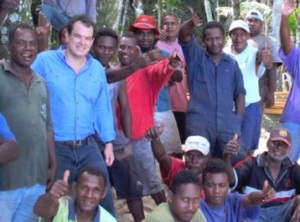Luke Rawalai | The Fiji Times
LANDOWNERS automatically waive their rights to lease conditions when they deposit their land with the Land Bank Unit under the Ministry of Lands.
Director Land Bank Samuela Naicegucegu confirmed this yesterday saying lease agreements were only binding between the tenants and the unit.
Responding to concerns raised by the four landowning units in Nawailevu in Bua regarding how they had not received any lease conditions, Mr Naicegucegu said landowners had no entitlement to the leasing conditions.
This was evident in the meeting held earlier this week where mataqali Naicobo spokesman Vilikesa Kaidawa said when they were first approached about their land being used for bauxite mining, the two officers (who were named at the meeting) from the unit gave them just a short time to look at the documents over the lease.
Mr Kaidawa said at the meeting the landowners were also told whether they agreed or not, the bauxite mining would go ahead.
Representatives of the four landowning units told the Standing Committee on Natural Resources that they were still in the dark about the lease arrangements made between them and Aurum Explorations Fiji Ltd (XINFA).
Aurum Exploration Fiji Ltd’s executive Derek Qiu confirmed they did not deal with the landowners to discuss lease conditions.
“We only dealt with Government and not the landowners,” Mr Qiu said.
At the meeting, Mr Kaidawa said they were not aware of the goodwill agreements made from the leasing of their land nor they had any documents containing the lease arrangements between them (landowners) and the mining company.
He told the committee the onus was on the Land Bank Unit to provide them with these important documents.
He said so far, the landowners did not understand what part of their submissions had been formally included into the lease as part of the lease arrangements between them and the company, or what was agreed to as part of the lease.
Mr Kaidawa said this was why people continued to question and doubt the whole project, adding they did not have a clear idea of where they stood as landowners.
When committee chairman Joeli Cawaki enquired if it was the same situation for the remaining three landowning units, Mr Kaidawa said they were all in the dark.
In an interview, Mr Naicegucegu said they would dispatch copies of the lease arrangements to the standing committee and the landowning units.
Earlier, a report tabled to the standing committee heard that the four landowning units in Nawailevu had already received $400,000 of about $1.5million paid to them.








